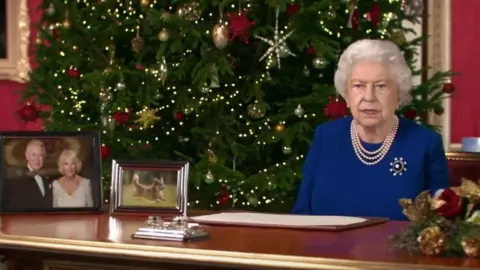Deepfake queen to deliver Channel 4 Christmas message
 Channel 4
Channel 4This year's Channel 4 alternative Christmas message will be delivered by a deepfake of the Queen.
While the Queen is delivering her traditional message on the BBC and ITV, her digitally created doppelgänger will be sharing its "thoughts" on Channel 4.
Buckingham Palace told the BBC it had no comment on the broadcast.
Channel 4 said the intention was to give a "stark warning" about fake news in the digital age.
Deepfake technology can be used to create convincing yet entirely fictional video content, and is often used to spread misinformation.
In the message, the deepfake will try its hand at a TikTok viral dance challenge.
'Countless imitations'
The five-minute message will refer to a number of controversial topics, including the decision by the Duke and Duchess of Sussex to leave the UK. It will also allude to the Duke of York's decision to step down from royal duties earlier this year after an interview he gave to the BBC about his relationship with sex offender Jeffrey Epstein.
The BBC's royal correspondent Nicholas Witchell was not impressed: "There have been countless imitations of the Queen. This isn't a particularly good one.
"The voice sounds what it is - a rather poor attempt to impersonate her. What makes it troubling is the use of video technology to attempt to sync her lips to the words being spoken."
Some members of the public have also suggested the video is "disrespectful" via posts on social media.
The media watchdog Ofcom said it had received "a small number of complaints", but because it is a post-transmission regulator could not consider them at this time.
While current technology does allow for voice deepfakes, the voice of this deepfake will be dubbed by British actress Debra Stephenson.
The TV star was previously the voice of a puppet of the monarch in the 2020 revival of satirical sketch show Spitting Image.
Stephenson said: "As an actress it is thrilling but it is also terrifying if you consider how this could be used in other contexts."
The deepfake has been created by Oscar-winning VFX studio Framestore.
Deepfake detection
Deepfakes first rose to prominence in early 2018.
At the time, a developer adapted cutting-edge artificial intelligence techniques to create software that swapped one person's face for another.
However, the process has since become much more accessible.
There are now numerous apps that require just a single photo in order to substitute a Hollywood actor for that of the user.
Earlier this year, Microsoft unveiled a tool that can spot deepfakes.
The firm said it hoped to help combat disinformation, but experts warned it was at risk of becoming outdated due to advances in technology.
Nina Schick, author of Deep Fakes and the Infocalypse, told the BBC there was growing concern about the other malicious ways deepfake technology could be used.
"While it offers tremendous commercial and creative opportunities, transforming entire industries from entertainment to communication, it is also a technology that will be weaponised.
"Used maliciously, AI-generated synthetic media, or deepfakes, are sophisticated forms of visual disinformation."
The Alternative Christmas Message will be shown on Channel 4 at 15:25 GMT on 25 December.